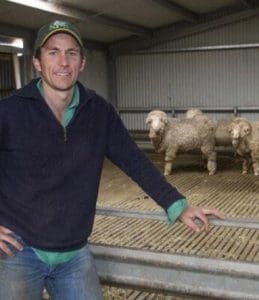
Terinallum’s Tim Gubbins will speak at the pasture update.
PADDOCK and flock management practices to improve lambing percentages will be outlined at a Meat & Livestock Australia pasture update at Willaura on June 21.
Farm manager Tim Gubbins from Terinallum at Darlington will outline how temporary fencing and paddock management has helped to improve twin lamb survival.
Terinallum Station livestock manager Chantel Reynolds said the trial of smaller mobs conducted last year by Dr Steve Cotton, of Dynamic Ag, for the National Lamb Density Project had resulted in improved survival rates.
“It seems to stop mis-mothering, especially at lamb marking.
“With smaller mobs, the lambs are more likely to find their mothers,” he said
“We had a lot of multiple bearing mobs come back at 190 percent marking rates,” Ms Reynolds said.
The MLA pasture update is hosted by Grassland Society of Southern Australia and will be held at the Willaura Football Netball Club on June 21 from 8.30am-12.30pm, followed by a barbecue lunch.
The More lambs, More feed and More $ Pasture Update will also feature Dr Cotton’s research at four MLA producer demonstration sites at Willaura and Tatyoon into the impact mob and paddock size has on lamb survival and what temporary fencing may offer in the lambing period.
Dr Cotton said preliminary analysis of the first 12 months of data from the four sites shows that when the mob size is halved there is improved survival. However, when the stocking rate becomes low relative to the size of the paddock, the number of lambs weaned per hectare goes down.
A panel of local agronomic specialists will lead a discussion on setting up feed for lambing, with a focus on pasture species, varieties, pasture management and soil fertility.
The Grassland Pasture Tech Group will present findings from the Grasslands Pilot Project which has trialled adoption of satellite data and Variable Rate Technology (VRT) throughout south-west Victoria.
Nuffield Scholar Jack England will speak about optimum feed and nutrient management through winter and early spring. From Kingston in South Australia, Mr England completed the international scholarship in 2016 where he investigated the benefits and costs of using VRT for fertiliser and trace element prescription in livestock systems.
For more information please go to www.grasslands.org.au. This event is supported by Glenelg Hopkins CMA through the Australian Government’s National Landcare Program.
The Pasture Update costs $20 for Grassland Society and MLA members and $30 for non-members and includes morning tea and lunch. To RSVP, contact GSSA secretary Melinda Caspersz 1300 137 550 [email protected]

HAVE YOUR SAY